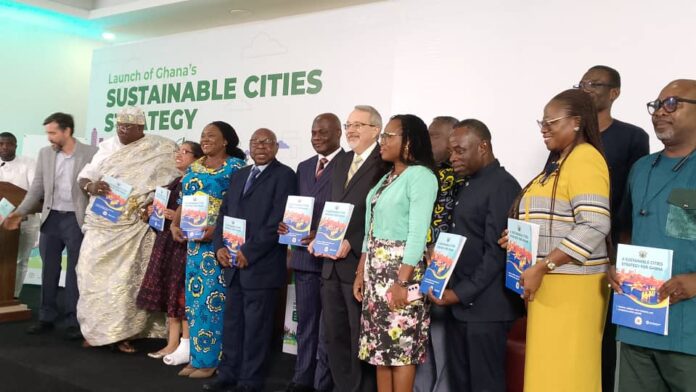The Ministry of Local Government, Chieftaincy and Religious Affairs has launched the Ghana Sustainable Cities Strategy (GSCS), a bold new framework aimed at transforming Ghana’s rapidly growing urban areas into inclusive, resilient, and prosperous cities.
Speaking at the official launch held at Alisa Hotel, North Ridge, sector Minister Ahmed Ibrahim underscored the urgent need for coordinated and sustainable urban development.
“Today marks another significant milestone in our collective journey towards building cities and towns that are more inclusive, green, resilient, and prosperous cities that reflect the aspirations of every Ghanaian,” the Minister stated.

With Ghana’s urban population currently at 56.7% and projected to reach 60.7% by 2030, the GSCS is designed to tackle both the opportunities and challenges of urbanization. These include infrastructure deficits, housing shortages, environmental degradation, inequality, and governance gaps.
Developed with technical and financial support from the World Bank, the GSCS offers a comprehensive, data-driven blueprint. It complements Ghana’s revised National Urban Policy and aligns with global development frameworks such as the UN Sustainable Development Goals and the African Union’s Agenda 2063.

The Minister emphasized the importance of multi-level, multi-sector collaboration and a people-centered approach that integrates digital infrastructure to promote transparency, inclusivity, and accountability.
“Our cities are living environments shaped by culture, heritage, and human values. Sustainable cities are not just about buildings and roads; they are about people,” Mr. Ibrahim affirmed.
The launch also reinforced Ghana’s commitment to international partnerships, particularly with the World Bank, whose support was instrumental in shaping the strategy.

As Ghana navigates the path toward a sustainable urban future, the GSCS offers a transformative roadmap calling on all stakeholders to play an active role in reshaping the country’s cities for generations to come.








